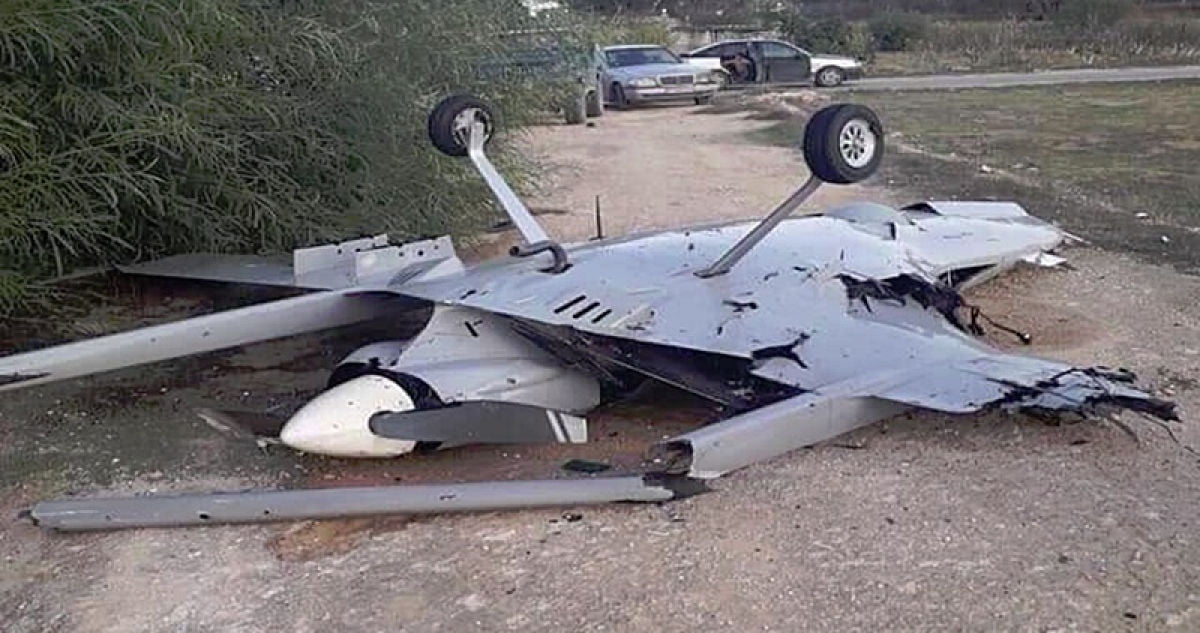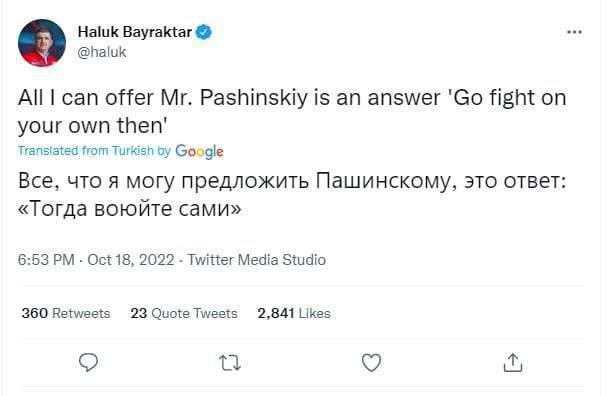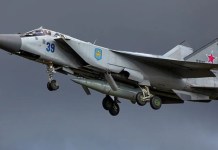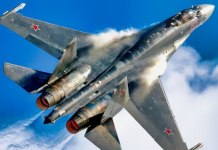The era of Turkiye’s TB-2 Bayraktar drones in Ukraine might finally end if reports from Russian media and social media comments from the Turkish company’s founder are to be believed.
Baykar has reportedly conveyed to the Ukrainian government its inability to set up a factory in partnership with a Ukrainian state-run defense firm.
Two primary reasons are believed to be behind the move.
One, the decreasing utility and increasing vulnerability of the drones to Russian air defense and electronic warfare reported by the mainstream Western press since June.
Secondly, a deal struck between Presidents Vladimir Putin and Recep Tayyip Erdogan to make Turkey into a “gas hub,” helping the latter realize its dreams of a regional powerhouse, has played a significant part in declining active Turkish support.
Observers believe Erdogan readily obliged Putin’s demands to stop arming Ukraine in return, given the decent personal rapport between the two leaders.
Bayraktars Began Falling Down
By late June, Ukraine had lost a lot of Bayraktars, evident by the scores of photos and videos published by pro-Russian and Russian government accounts.

EurAsian Times had reported how after initial tactical successes, the Turkish drones began falling to advanced Russian air defense and EW systems.
A Foreign Policy report detailed how junior Ukrainian officers, frontline troops, and senior staff members were split over their continued use, where the latter was insistent on their continued employment. The Ukrainians had to reduce their employment to 20 to 30 sorties a day.
Even US defense officials expressed reluctance to send the costly MQ-1C Gray Eagle drones to Ukraine. Russian Pantsir air defense systems could be the reason, as they were believed to have successfully shot down many of Ukraine’s jets and drones.
A subsequent analysis by EurAsian Times revealed how Russia had long led in advancing its Electronic Warfare (EW) capabilities since its intervention in Syria in 2014. It had developed capabilities to disable and jam most GPS signals and highly encrypted radio frequencies.
Zelensky Still Wanted Made-In-Ukraine Bayraktars
On September 9, Ukraine President Vladimir Zelensky met the CEO of Baykar, Haluk Bayraktar, in Kyiv. Besides bestowing Bayraktar with the Order of Merit, the statement from Zelensky’s office said the two discussed the construction of a Baykar plant in Ukraine using Ukrainian components.
It would be essential to note that Bayraktar’s Chief Technology Officer, Selcuk Bayraktar, is also Erdogan’s son-in-law.
This plant was expected to use the technical and logistical facilities of Motor Sich Joint Stock Company (JSC), Ukraine’s state-run aircraft engine manufacturer – apparently located in Zaporizhzhia.
Besides being home to the Zaporizhzhia Nuclear Power Plant (ZNPP), which Russia alleges Ukraine has been shelling, it was also one of the four regions along with Kherson, Donetsk, and Lugansk that voted in a referendum to accede with the Russian Federation.

Putin-Erdogan Deal
On October 13, Putin and Erdogan met on the sidelines of a summit at Astana in Kazakhstan. The Russian president proposed supplying gas through the TurkStream pipeline beneath the Black Sea to Turkey.
Reports quoted Putin having told Erdogan that the “gas hub” would help “determine the price of gas (independent of) political overtones.
Erdogan later said in public interactions that both energy authorities were conducting technical studies on the project’s viability. He also said before Turkiye’s Parliament and a meeting of his Justice and Development Party (AKP) that he had agreed to Putin’s proposal, according to multiple reports on October 19.
The same day, Russian cyber pranksters Vovan and Lexus posed as US officials and recorded senior Ukrainian official Serhiy Pashinsky criticizing the TB-2 in an online interview.
Pashinsky is the People’s Deputy of Ukraine and a Chairman of the Committee of National Security and Defense Council of Ukraine.
Pashinsky thought he was talking to former US ambassador to Russia, Michael McFaul. He said, “there is more PR and corruption in Bayraktar than combat use.”
The politician, who heads the Association of Defense Enterprises of Ukraine, went on to say that the Turkish drones, which Western and Ukrainian media have hailed as a game changer on the battlefield in the ongoing military conflict between Russia and Ukraine, are the “first and foremost a PR project.”
“I was personally against it because they are extremely vulnerable to air defense systems. They were all shot down within a week. (The drone) is not a self-sufficient weapon” (it cannot work by itself as it) “gets shot down by air defense systems in a flash and has no combat effectiveness at all,” he said. This Russian translation of the Pashinsky interview was circulating on Russian social media and private groups.
Baykar himself angrily had tweeted on October 18, ostensibly as a retort to Pashinsky’s clip that had been going viral. “All I can offer Mr. Pashinsky is an answer, ‘Go fight on your own then.'” The tweet is no longer visible, but a screenshot is available.

Popular Russian defense publications reported that talks about the Baykar plant had “faded” from the Ukrainian press in September.
“First, it was rumored that the Turks have decided to reduce the supply of drones to Ukraine, then there is information that the rumors were not rumors, but on the contrary, reliable data.
A Russian media report says as Putin & Erdogan plan to create a gas hub in Turkey, Ankara must terminate the supply of UAVs to Kyiv,” which was a precondition of the agreement.
- The author can be reached at satamp@gmail.com
- Follow EurAsian Times on Google News





